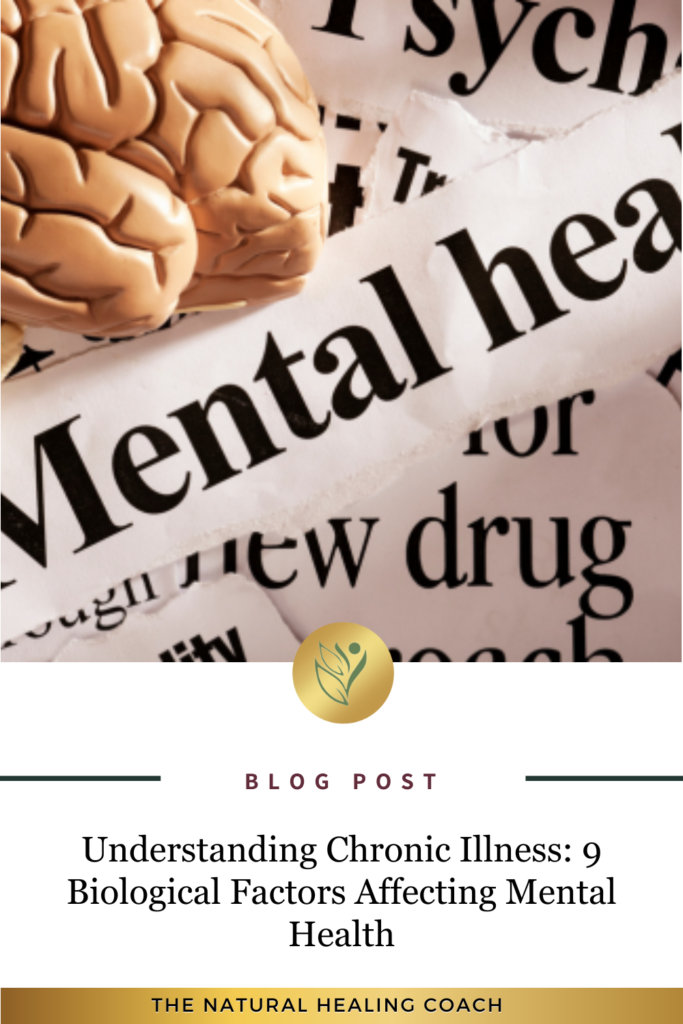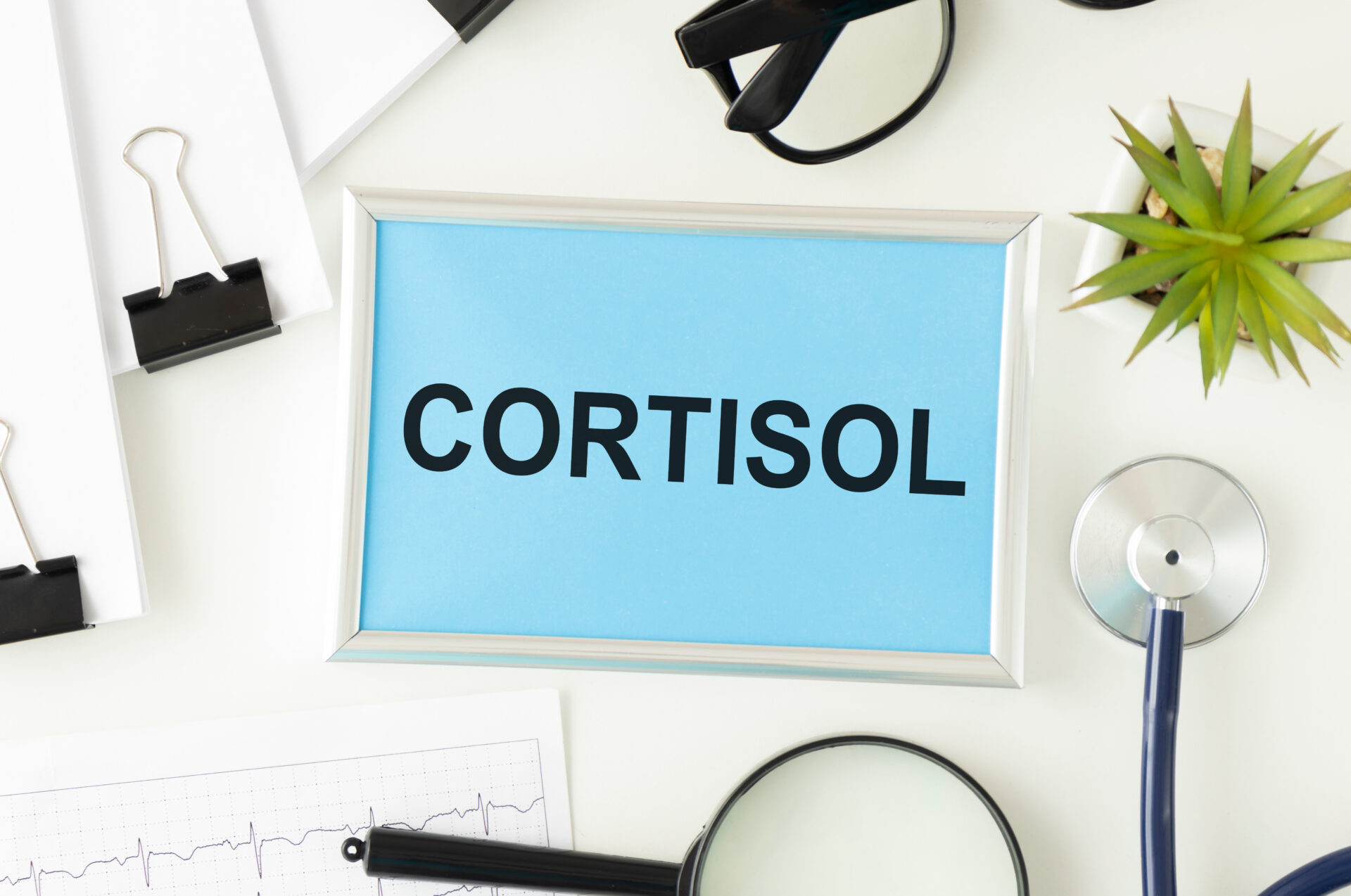Introduction
Living with a chronic illness is a daily battle that extends beyond the physical symptoms. The persistent pain, fatigue, and limitations can take a significant toll on mental health. Many individuals with chronic illnesses experience depression, anxiety, and other mental health challenges, making it crucial to understand the underlying causes.
While the emotional impact of living with a chronic condition is often acknowledged, the scientific and biological factors contributing to these mental health issues are less frequently discussed. Exploring these factors provides a clearer picture of how chronic illness affects the mind and offers insights into potential treatments and coping strategies. Understanding the intricate connection between chronic physical conditions and mental health can lead to better comprehensive care, helping those affected to manage both their physical and emotional well-being more effectively.
9 Biological Factors Affecting Mental Health
The Brain-Body Connection
Chronic illnesses have a profound effect on the nervous system, impacting both the central and peripheral components, which in turn influence mental health.
- Central Nervous System: Chronic illnesses can alter the structure and function of the central nervous system. These changes can impact cognitive function, leading to difficulties with memory, attention, and decision-making. Additionally, alterations in the central nervous system can affect emotional regulation, contributing to mood disorders such as depression and anxiety. For example, multiple sclerosis and lupus can cause brain lesions and atrophy, directly impacting mental health.
Tip: Engage in cognitive exercises such as puzzles, reading, and memory games to help maintain cognitive function. Mindfulness and meditation can also improve emotional regulation.
- Peripheral Nervous System: Disruptions in the peripheral nervous system are common in chronic illness and can lead to chronic pain and discomfort. This persistent pain can significantly impact mental health, leading to increased stress, anxiety, and depression. Conditions like fibromyalgia and diabetic neuropathy often result in nerve damage, causing ongoing pain that can be debilitating and mentally exhausting.
Tip: Physical therapy and gentle exercise, like yoga or tai chi, can help manage pain. Consult with a healthcare provider about appropriate pain management strategies.
Inflammation and Its Impact on Mental Health
Inflammation is a key factor in many chronic illnesses and has a direct impact on mental health through various pathways.
- Cytokines: Chronic inflammation leads to the release of cytokines, which are signaling proteins that play a role in immune responses. Elevated cytokine levels can affect brain function and mood regulation, potentially leading to depression and anxiety. Pro-inflammatory cytokines such as IL-6 and TNF-alpha can cross the blood-brain barrier and influence the brain’s chemical environment, contributing to psychiatric symptoms.
Tip: Incorporate anti-inflammatory foods into your diet, such as fatty fish, leafy greens, and berries. Regular physical activity can also help reduce inflammation.
- Neuroinflammation: Inflammation in the brain, or neuroinflammation, can impair cognitive functions such as learning and memory. It also increases the risk of developing mood disorders, including depression and anxiety. Neuroinflammatory processes are seen in diseases like Alzheimer’s and Parkinson’s, which also have high comorbidity with depression.
Tip: Ensure adequate sleep and manage stress through relaxation techniques to help reduce neuroinflammation. Omega-3 supplements and anti-inflammatory medications may also be beneficial.
Neurotransmitter Imbalance
Neurotransmitters are chemical messengers that play a crucial role in regulating mood and cognition. Chronic illnesses can lead to imbalances in these neurotransmitters, affecting mental health.
- Serotonin: Often referred to as the “feel-good” neurotransmitter, serotonin plays a significant role in mood regulation. Imbalances in serotonin levels can lead to mood disorders such as depression and anxiety. Chronic illnesses like irritable bowel syndrome (IBS) and fibromyalgia are often associated with disrupted serotonin levels, influencing both gut and mental health.
Tip: Maintain a diet rich in tryptophan (a precursor to serotonin) found in foods like turkey, eggs, and cheese. Consider talking to your doctor about serotonin-boosting medications if needed.
- Dopamine: This neurotransmitter is involved in reward and pleasure pathways. Imbalances in dopamine levels can affect motivation, pleasure, and emotional regulation, contributing to mental health issues such as depression. Conditions such as Parkinson’s disease and chronic fatigue syndrome can disrupt dopamine pathways, leading to symptoms of anhedonia and apathy.
Tip: Engage in activities that you enjoy and that give you a sense of accomplishment. Regular exercise, adequate sleep, and a healthy diet can also help maintain dopamine levels.
- Norepinephrine: Norepinephrine is essential for the stress response and alertness. Imbalances in this neurotransmitter can contribute to anxiety and depression, affecting an individual’s ability to cope with stress. Chronic stress from illnesses like chronic obstructive pulmonary disease (COPD) and heart disease can dysregulate norepinephrine production, exacerbating mental health problems.
Tip: Practice stress management techniques such as deep breathing exercises, progressive muscle relaxation, and mindfulness meditation.
HPA Axis Dysregulation
The hypothalamic-pituitary-adrenal (HPA) axis plays a crucial role in the body’s response to stress. Chronic illness can lead to dysregulation of this system, affecting mental health.
- Hypothalamic-Pituitary-Adrenal (HPA) Axis: Chronic stress from illness can dysregulate this axis, leading to abnormal cortisol levels. This dysregulation can cause persistent fatigue, sleep disturbances, and mood disorders. Chronic illnesses like rheumatoid arthritis and lupus can cause sustained HPA axis activation, leading to elevated stress hormones and mental health issues.
Tip: Establish a regular sleep schedule and incorporate relaxation practices into your daily routine. Seek professional support if you experience persistent sleep disturbances or chronic stress.
- Cortisol: Elevated or reduced cortisol levels can impact mood, energy levels, and overall mental health. High cortisol levels can lead to symptoms of anxiety and agitation, while low levels can cause fatigue and depression. Conditions such as chronic fatigue syndrome and Addison’s disease can disrupt cortisol regulation, severely affecting mental health.
Tip: Engage in regular physical activity, as exercise can help regulate cortisol levels. Avoid excessive caffeine and alcohol, which can negatively impact cortisol production.
Oxidative Stress and Mental Health
Oxidative stress occurs when there is an imbalance between free radicals and antioxidants in the body, leading to cellular damage. Chronic illnesses often exacerbate oxidative stress, impacting mental health.
- Free Radicals: High levels of free radicals can cause cellular damage, including in brain cells. This damage can contribute to cognitive decline and mood disorders. Chronic illnesses such as diabetes and cardiovascular disease can increase oxidative stress, leading to neurodegenerative changes and mental health problems.
Tip: Incorporate antioxidant-rich foods such as berries, nuts, and dark chocolate into your diet. Consider antioxidant supplements like vitamin C and E, but consult with a healthcare provider first.
- Antioxidants: Deficiency in antioxidants can exacerbate oxidative stress, leading to cognitive decline and mood disorders. Ensuring adequate intake of antioxidants through diet or supplementation can help mitigate these effects. Conditions like chronic kidney disease and cancer can deplete antioxidant defenses, making individuals more susceptible to oxidative damage and associated mental health issues.
Tip: Focus on a balanced diet rich in fruits, vegetables, and whole grains. Avoid smoking and limit exposure to environmental toxins that can increase oxidative stress.
Genetic Factors
Genetic predispositions can play a significant role in determining an individual’s susceptibility to mental health issues in the context of chronic illness.
- Genetic Predisposition: Certain genetic markers can make individuals more susceptible to both chronic illnesses and mental health disorders. For example, the presence of the APOE4 gene is linked to both Alzheimer’s disease and depression, suggesting a genetic overlap in these conditions.
Tip: If you have a family history of mental health disorders, consider genetic counseling. Stay informed about your genetic risks and engage in proactive mental health care strategies.
- Gene-Environment Interaction: The interplay between genetic factors and environmental stressors can influence mental health outcomes. Epigenetic changes, where gene expression is altered without changing the DNA sequence, can be triggered by chronic illness and impact mental health. For instance, chronic stress from illness can lead to epigenetic modifications that increase the risk of depression.
Tip: Manage environmental stressors through lifestyle changes and seek support from mental health professionals. Practice stress-reducing techniques and maintain a healthy environment.
The Gut-Brain Axis
The gut-brain axis is a bidirectional communication system between the gut and the brain. Chronic illnesses affecting the gut can significantly impact mental health.
- Microbiome: The balance of gut bacteria can affect brain health, influencing mood and cognitive function. Dysbiosis, or imbalance in the gut microbiome, is linked to conditions such as IBS and can lead to symptoms of anxiety and depression.
Tip: Consume a diet rich in probiotics and prebiotics to support gut health. Fermented foods like yogurt, sauerkraut, and kimchi can help maintain a healthy gut microbiome.
- Gut Permeability: Increased gut permeability (leaky gut) can lead to systemic inflammation, affecting mental health. Conditions like celiac disease and Crohn’s disease often involve increased gut permeability, contributing to inflammation and psychiatric symptoms.
Tip: Avoid foods that trigger inflammation and gut permeability. Focus on a diet rich in whole, unprocessed foods and consider working with a nutritionist to develop a gut-friendly eating plan.
Immune System and Autoimmune Responses
Chronic illnesses often involve dysregulation of the immune system, which can have significant implications for mental health.
- Autoimmune Responses: In autoimmune diseases, the body’s immune response can attack healthy tissues, including the brain. This can lead to neuroinflammation and mental health issues. Conditions like multiple sclerosis and lupus are prime examples where autoimmune responses impact mental health.
Tip: Work with healthcare providers to manage autoimmune conditions effectively. Regular monitoring and appropriate medication can help control immune responses and reduce neuroinflammation.
- Chronic Immune Activation: Persistent immune system activation can contribute to neuroinflammation and mental health issues. Chronic infections or ongoing immune challenges in conditions like HIV/AIDS and chronic fatigue syndrome can lead to sustained immune activation, affecting mental health.
Tip: Ensure regular check-ups and follow prescribed treatments to manage chronic infections and immune-related conditions. Engage in healthy lifestyle practices that support immune function, such as adequate sleep, balanced nutrition, and stress management.
Neuroplasticity and Chronic Illness
Neuroplasticity is the brain’s ability to adapt and change in response to new experiences. Chronic illnesses can negatively affect this capacity, impacting mental health.
- Neuroplasticity: The brain’s ability to adapt and change can be impaired by chronic illness, affecting learning, memory, and emotional regulation. Conditions like stroke and traumatic brain injury can reduce neuroplasticity, leading to cognitive deficits and mood disorders.
Tip: Engage in activities that stimulate the brain, such as learning new skills, playing musical instruments, or engaging in creative pursuits. Cognitive rehabilitation therapy can also help enhance neuroplasticity.
- Brain Volume Changes: Chronic illnesses can lead to changes in brain volume, particularly in areas related to mood and cognition. For example, chronic pain conditions like fibromyalgia are associated with reduced gray matter volume in the brain, correlating with an increased risk of depression.
Tip: Regular physical exercise has been shown to support brain health and promote neurogenesis. Incorporate both aerobic and resistance training exercises into your routine.
By delving deeper into these biological factors and incorporating these tips, individuals with chronic illnesses can better manage the complex interplay between their physical and mental health, leading to more comprehensive and effective approaches to care.
Future Directions
Emerging Research
Exciting new research areas are shedding light on the complex relationship between chronic illness and mental health, offering hope for more effective treatments in the future.
Innovative Approaches
Innovative approaches in the medical field are being explored to better manage the intersection of chronic illness and mental health.
By staying informed about these emerging research areas and innovative approaches, individuals with chronic illnesses and their healthcare providers can explore new avenues for improving mental health outcomes and overall quality of life.
Final Thoughts

Understanding the scientific and biological factors that link chronic illness to mental health is crucial for effective management and care. Chronic illnesses are often accompanied by a complex interplay of physical symptoms and mental health challenges that can significantly impact an individual’s quality of life. We’ve discussed how the brain-body connection, inflammation, neurotransmitter imbalances, HPA axis dysregulation, oxidative stress, genetic factors, the gut-brain axis, immune system responses, and neuroplasticity all play significant roles in affecting mental health in those with chronic illnesses.
Addressing these factors is essential for improving mental health outcomes. By recognizing and managing these biological influences, individuals can take proactive steps to maintain both their physical and mental well-being. It’s important to remember that mental health is not just influenced by psychological factors but also by physiological processes that can be targeted and treated. Holistic care that integrates medical, psychological, and lifestyle interventions offers the best approach to managing the multifaceted impacts of chronic illness.
Moreover, understanding these connections can empower individuals and their caregivers to advocate for comprehensive care that addresses both physical and mental health needs. Knowledge is a powerful tool in managing chronic illness, and staying informed about the latest research and treatment options can lead to better health outcomes and improved quality of life.
Call to Action
If you or someone you know is struggling with mental health issues alongside a chronic illness, it is vital to seek medical advice to develop a comprehensive management plan. Healthcare providers can offer tailored treatments that address both physical and mental health needs, ensuring a more holistic approach to care. Additionally, exploring further resources and support can deepen your understanding of the biological aspects of mental health in chronic illness.
Consider joining support groups, seeking professional counseling, and staying informed about the latest research in this field. Engaging with educational materials and connecting with others who share similar experiences can provide valuable insights and emotional support. Taking these steps can make a significant difference in managing and improving overall health and quality of life. Remember, you are not alone in this journey, and there are many resources and communities ready to support you in achieving better health and well-being
If you are looking for more tips and support, join me over on my group page, The Village – A Natural HEALing Community, to get tons of information and tips to help you take your HEALTHY EATING and ACTIVE LIVING to the next level.
REFERENCES:
- The Brain-Body Connection:
- Central Nervous System and Chronic Illness: https://www.ncbi.nlm.nih.gov/pmc/articles/PMC5726389/
- Peripheral Nervous System and Pain: https://www.ncbi.nlm.nih.gov/pmc/articles/PMC6611796/
- Inflammation and Its Impact on Mental Health:
- Cytokines and Mental Health: https://www.ncbi.nlm.nih.gov/pmc/articles/PMC5542678/
- Neuroinflammation and Depression: https://www.ncbi.nlm.nih.gov/pmc/articles/PMC3619663/
- Neurotransmitter Imbalance:
- Serotonin and Mood Disorders: https://www.ncbi.nlm.nih.gov/pmc/articles/PMC3754301/
- Dopamine and Depression: https://www.ncbi.nlm.nih.gov/pmc/articles/PMC4377363/
- Norepinephrine and Anxiety: https://www.ncbi.nlm.nih.gov/pmc/articles/PMC4502430/
- HPA Axis Dysregulation:
- HPA Axis and Chronic Stress: https://www.ncbi.nlm.nih.gov/pmc/articles/PMC4465119/
- Cortisol and Mental Health: https://www.ncbi.nlm.nih.gov/pmc/articles/PMC5579402/
- Oxidative Stress and Mental Health:
- Free Radicals and Brain Health: https://www.ncbi.nlm.nih.gov/pmc/articles/PMC3036734/
- Antioxidants and Cognitive Function: https://www.ncbi.nlm.nih.gov/pmc/articles/PMC6835434/
- Genetic Factors:
- Genetic Predisposition and Mental Health: https://www.ncbi.nlm.nih.gov/pmc/articles/PMC3095607/
- Gene-Environment Interaction: https://www.ncbi.nlm.nih.gov/pmc/articles/PMC4118871/
- The Gut-Brain Axis:
- Microbiome and Mental Health: https://www.ncbi.nlm.nih.gov/pmc/articles/PMC5641835/
- Gut Permeability and Anxiety: https://www.ncbi.nlm.nih.gov/pmc/articles/PMC5440529/
- Immune System and Autoimmune Responses:
- Autoimmune Diseases and Mental Health: https://www.ncbi.nlm.nih.gov/pmc/articles/PMC6061531/
- Chronic Immune Activation: https://www.ncbi.nlm.nih.gov/pmc/articles/PMC4788123/
- Neuroplasticity and Chronic Illness:
- Neuroplasticity and Cognitive Decline: https://www.ncbi.nlm.nih.gov/pmc/articles/PMC3155256/
- Brain Volume Changes and Chronic Pain: https://www.ncbi.nlm.nih.gov/pmc/articles/PMC4180672/
- Emerging Research
- Genomics and Personalized Medicine: https://www.ncbi.nlm.nih.gov/pmc/articles/PMC6332409/
- Neuroinflammation Studies: https://www.ncbi.nlm.nih.gov/pmc/articles/PMC5786317/
- Gut-Brain Axis Exploration: https://www.ncbi.nlm.nih.gov/pmc/articles/PMC7157974/
- Psychoneuroimmunology: https://www.ncbi.nlm.nih.gov/pmc/articles/PMC6368288/
- Innovative Approaches
- Digital Health Tools: https://www.ncbi.nlm.nih.gov/pmc/articles/PMC7173026/
- Integrative Medicine: https://www.ncbi.nlm.nih.gov/pmc/articles/PMC6482997/
- Telemedicine and Teletherapy: https://www.ncbi.nlm.nih.gov/pmc/articles/PMC7539921/
- Mind-Body Interventions: https://www.ncbi.nlm.nih.gov/pmc/articles/PMC6166182/
- Neurofeedback: https://www.ncbi.nlm.nih.gov/pmc/articles/PMC6104634/
MORE RELATED POSTS:













+leave a comment . . .